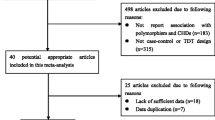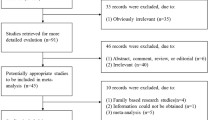Abstract
Methionine synthase reductase (MTRR) plays a major role in hyperhomocysteinemia, a risk factor related to the occurrence of congenital heart defects (CHDs). However, the associations between MTRR polymorphism and CHDs have been inconclusive. Thus, a metaanalysis of eight case–control studies was conducted to investigate 3,592 cases and 3,638 control subjects for MTRR A66G polymorphism to identify the association. Odds ratios (ORs) and 95 % confidence intervals (95 % CIs) were used to assess the strength of the association. The results showed that MTRR A66G polymorphism was associated with a higher CHD risk in the allele comparison (G vs A: OR 1.163; 95 % CI 1.016–1.330; P heterogeneity = 0.004), the homozygote comparison (GG vs AA: OR 1.332; 95 % CI 1.020–1.740; P heterogeneity = 0.035), and the dominant model (GG/AG vs AA: OR 1.218; 95 % CI 1.001–1.482; P heterogeneity = 0.001). In the subgroup analysis, this polymorphism was associated with CHDs in Asians in the homozygote comparison (GG vs AA: OR 1.427; 95 % CI 1.017–2.001; P heterogeneity = 0.019) and the allele comparison (G vs A: OR 1.203; 95 % CI 1.018–1.422; P heterogeneity = 0.002). In summary, the metaanalysis demonstrated that MTRR A66G polymorphism is a risk factor for CHDs. Further studies should be performed to investigate the association of plasma homocysteine levels, enzyme activity, parental genotypes, and vitamin complex intakes with the risk of CHDs.





Similar content being viewed by others
References
Brouns R, Ursem N, Lindemans J, Hop W, Pluijm S, Steegers E, Steegers-Theunissen R (2008) Polymorphisms in genes related to folate and cobalamin metabolism and the associations with complex birth defects. Prenat Diagn 28:485–493
Burn J, Brennan P, Little J, Holloway S, Coffey R, Somerville J, Dennis NR, Allan L, Arnold R, Deanfield JE, Godman M, Houston A, Keeton B, Oakley C, Scott O, Silove E, Wilkinson J, Pembrey M, Hunter AS (1998) Recurrence risks in offspring of adults with major heart defects: results from first cohort of British collaborative study. Lancet 351:311–316
Deng L, Elmore CL, Lawrance AK, Matthews RG, Rozen R (2008) Methionine synthase reductase deficiency results in adverse reproductive outcomes and congenital heart defects in mice. Mol Genet Metab 94:336–342
Elmore CL, Wu X, Leclerc D, Watson ED, Bottiglieri T, Krupenko NI, Krupenko SA, Cross JC, Rozen R, Gravel RA, Matthews RG (2007) Metabolic derangement of methionine and folate metabolism in mice deficient in methionine synthase reductase. Mol Genet Metab 91:85–97
Fredriksen A, Meyer K, Ueland PM, Vollset SE, Grotmol T, Schneed J (2007) Large-scale population-based metabolic phenotyping of thirteen genetic polymorphisms related to one-carbon metabolism. Hum Mutat 28:856–865
Gilboa SM, Salemi JL, Nembhard WN, Fixler DE, Correa A (2010) Mortality resulting from congenital heart disease among children and adults in the United States, 1999 to 2006. Circulation 122:2254–2263
Goldmuntz E, Woyciechowski S, Renstrom D, Lupo PJ, Mitchell LE (2008) Variants of folate metabolism genes and the risk of conotruncal cardial defects. Circ Cardiovasc Genet 1:126–132
Gong T, Li F, Huang H, Dong XY (2010) Relationship of maternal and child polymorphism in methionine synthetase and methionine synthase reductase with congenital heart disease. Acta Acad Medicainae Militaris Tertiae 32:127–130
Hoffman JI (1995) Incidence of congenital heart disease: I. Postnatal incidence. Pediatr Cardiol 16:103–113
Hoffman JI (1995) Incidence of congenital heart disease: II. Prenatal incidence. Pediatr Cardiol 16:155–165
Li Y, Wang JB, Zheng LP (2004) Association of the methylenetetrahydrofolate reductase, methionine synthase reductase polymorphism, and congenital heart disease. Ying Yang Jian Kang Xin Guan Cha 25:5–11
Liu YS, Yin XG, Wang JF, Yu HL, Liu HP, Meng FC, Liu DM (2007) Relationship between genetic polymorphism of homocysteine metabolism enzyme and congenital heart disease. Chin J Cardiovasc Rev 5:201–213
Locke AE, Dooley KJ, Tinker SW, Cheong SY, Feingold E, Allen EG, Freeman SB, Torfs CP, Cua CL, Epstein MP, Wu MC, Lin X, Capone G, Sherman SL, Bean LJ (2010) Variation in folate pathway genes contributes to risk of congenital heart defects among individuals with Down syndrome. Genet Epidemiol 34:613–623
Nora JJ (1993) Causes of congenital heart diseases: old and new modes, mechanisms, and models. Am Heart J 125:1409–1419
Nora JJ, Nora AH (1978) The evolution of specific genetic and environmental counseling in congenital heart diseases. Circulation 57:205–213
Pishva SR, Vasudevan R, Etemad A, Heidari F, Komara M, Ismail P, Othman F, Karimi A, Sabri MR (2013) Analysis of MTHFR and MTRR gene polymorphisms in Iranian ventricular septal defect subjects. Int J Mol Sci 14:2739–2752
Shaw GM, Lu W, Zhu H, Yang W, Briggs FB, Carmichael SL, Barcellos LF, Lammer EJ, Finnell RH (2009) 118 SNPs of folate-related genes and risks of spina bifida and conotruncal heart defects. BMC Med Genet 10:49–59
Smedts HP, Rakhshandehroo M, Verkleij-Hagoort AC, de Vries JH, Ottenkamp J, Steegers EA, Steegers-Theunissen RP (2008) Maternal intake of fat, riboflavin, and nicotinamide and the risk of having offspring with congenital heart defects. Eur J Nutr 47:357–365
Swanson DA, Liu ML, Baker PJ, Garrett L, Stitzel M, Wu J, Harris M, Banerjee R, Shane B, Brody LC (2001) Targeted disruption of the methionine synthase gene in mice. Mol Cell Biol 21:1058–1065
van Beynum IM, Kouwenberg M, Kapusta L, den Heijer M, van der Linden IJ, Daniels O, Blom HJ (2006) MTRR 66A>G polymorphism in relation to congenital heart defects. Clin Chem Lab Med 44:1317–1323
Verkleij-Hagoort AC, de Vries JH, Ursem NT, de Jonge R, Hop WC, Steegers-Theunissen RP (2006) Dietary intake of B-vitamins in mothers born a child with a congenital heart defect. Eur J Nutr 45:478–486
Verkleij-Hagoort AC, van Driel LM, Lindemans J, Isaacs A, Steegers EA, Helbing WA, Uitterlinden AG, Steegers-Theunissen RP (2008) Genetic and lifestyle factors related to the periconception vitamin B12 status and congenital heart defects: a Dutch case–control study. Mol Genet Metab 94:112–119
Wilson A, Platt R, Wu Q, Leclerc D, Christensen B, Yang H, Gravel RA, Rozen R (1999) A common variant in methionine synthase reductase combined with low cobalamin (vitamin B12) increases risk for spina bifida. Mol Genet Metab 67:317–323
Yin M, Dong LY, Zheng JH, Zhang HB, Liu JF, Xu ZW (2012) Metaanalysis of the association between MTHFR C677T polymorphism and the risk of congenital heart defects. Ann Hum Genet 76:9–16
Zeng W, Liu L, Tong Y, Liu HM, Dai L, Mao M (2011) A66G and C524T polymorphisms of the methionine synthase reductase gene are associated with congenital heart defects in the Chinese Han population. Genet Mol Res 10:2597–2605
Zhao JY, Yang XY, Gong XH, Gu ZY, Duan WY, Wang J, Ye ZZ, Shen HB, Shi KH, Hou J, Huang GY, Jin L, Qiao B, Wang HY (2012) Functional variant in methionine synthase reductase intron-1 significantly increases the risk of congenital heart disease in the Han Chinese population. Circulation 125:482–490
Author information
Authors and Affiliations
Corresponding author
Additional information
Di Yu and Lei Yang have equally contributed to this work.
Rights and permissions
About this article
Cite this article
Yu, D., Yang, L., Shen, S. et al. Association Between Methionine Synthase Reductase A66G Polymorphism and the Risk of Congenital Heart Defects: Evidence From Eight Case–Control Studies. Pediatr Cardiol 35, 1091–1098 (2014). https://doi.org/10.1007/s00246-014-0948-9
Received:
Accepted:
Published:
Issue Date:
DOI: https://doi.org/10.1007/s00246-014-0948-9




